★★½
“Better red than dead. Albeit, only just.”
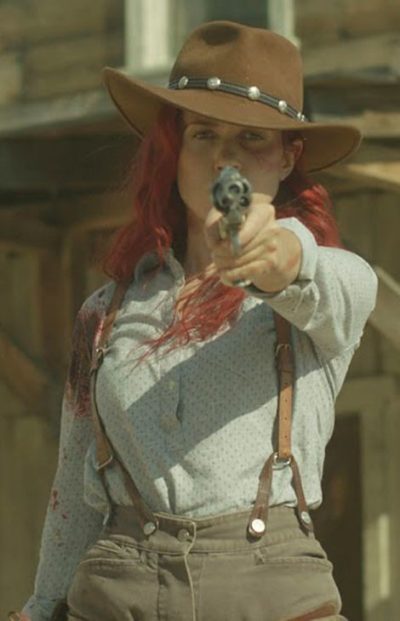 Josephine “Joe” Cassidy (Eiland) is promised in marriage to Tom (Jenkins), the son of the area’s richest rancher, but her heart actually belongs to Jakob (Grasl), the Indian who is Tom’s adopted brother. The two lovers consummate their relationship when Tom is away, but the spurned fiancee hatches a long-term plan to get revenge. Years later, after becoming the local sheriff, he uses these connections to frame and execute Jakob for murder. Word of this reaches Joe, who conveniently for the plot is handy with a firearm, because her father (Cramer) was a renowned bounty-hunter, and passed on the necessary skills to her. Dying her hair red – hence the title – she sets out to take revenge on Tom, only for him to reveal that Jakob is not dead… Not yet, anyway.
Josephine “Joe” Cassidy (Eiland) is promised in marriage to Tom (Jenkins), the son of the area’s richest rancher, but her heart actually belongs to Jakob (Grasl), the Indian who is Tom’s adopted brother. The two lovers consummate their relationship when Tom is away, but the spurned fiancee hatches a long-term plan to get revenge. Years later, after becoming the local sheriff, he uses these connections to frame and execute Jakob for murder. Word of this reaches Joe, who conveniently for the plot is handy with a firearm, because her father (Cramer) was a renowned bounty-hunter, and passed on the necessary skills to her. Dying her hair red – hence the title – she sets out to take revenge on Tom, only for him to reveal that Jakob is not dead… Not yet, anyway.
The structure here is quite convoluted – rather needlessly, I’d say. Not only does it unfold in several different eras, the entire thing is enclosed in wraparound sections, where the story of Cassidy Red is being told, for inspirational purposes, by a piano-player in a brothel to one of the working girls. It’s definitely a case where less feels like it would have been more, with a straightforward chronological timeline working to the film’s benefit, instead of characters dropping in and out. Perhaps the director felt that might have been too simple, for once you peel away the trapping, this is indeed a very straightforward tale of revenge. Is that necessarily a bad thing, though?
This was submitted for Knudsen’s thesis at UCLA’s School of Theater, Film, and Television, which perhaps explains some of the issues here: on occasion, it certainly does feels as if it was an academic requirement with an earnest Message (capital M used deliberately), rather than wanting to tell its story. The best section is likely the one where Joe is being taught the mechanics of gun-fighting by her father, which is very well written, performed and edited. The result is a sequence that sheds genuine light into the mindset of someone who, for survival, has to be permanently ready to shoot to kill. Given the limited budget here, credit is due for production values which are generally good. It was filmed largely on location at Old Tucson Studios, and that adds authenticity to the 19th-century Arizona setting, which some films wouldn’t have bothered with.
Other parts, unfortunately, fall short of that, and some are flat-out unconvincing – the scene where Jakob is taken on board as a foster son, for example, seems entirely inexplicable, and they just shouldn’t have bothered, since it’s not something the audience needs to see. It’s a shame, since the central performance is good: however, the two male leads both struggle to be more than forgettable, and that leaves the end result feeling unbalanced on the dramatic level. This sporadic quality is perhaps the biggest problem: there seems a general unevenness of tone and approach, resulting in a film which takes two steps forward, then one back.
Dir: Matt Knudsen
Star: Abigail Eiland, David Thomas Jenkins, Jason Grasl, Rick Cramer





 I spent most of the movie going back and forth as to whether or not this qualified for inclusion here. Was its lead, perhaps, just
I spent most of the movie going back and forth as to whether or not this qualified for inclusion here. Was its lead, perhaps, just  I’m tempted to award this an extra half-star, simply for pissing off liberal film critics, upset by the fact that most of the film is devoted to a white woman killing Latino drug dealers. Of course, they completely miss all the points, instead complaining – and these are direct quotes – there is “not a word about corporate complicity in the opioid crisis” and that the heroine’s “true enemy is a system of income inequality driven by hyper-capitalism.” Because, of course, if was hyper-capitalism which gunned down the husband and daughter of Riley North (Garner) in the parking lot of a fun-fair. Oh, my mistake: it was Latino drug dealers.
I’m tempted to award this an extra half-star, simply for pissing off liberal film critics, upset by the fact that most of the film is devoted to a white woman killing Latino drug dealers. Of course, they completely miss all the points, instead complaining – and these are direct quotes – there is “not a word about corporate complicity in the opioid crisis” and that the heroine’s “true enemy is a system of income inequality driven by hyper-capitalism.” Because, of course, if was hyper-capitalism which gunned down the husband and daughter of Riley North (Garner) in the parking lot of a fun-fair. Oh, my mistake: it was Latino drug dealers.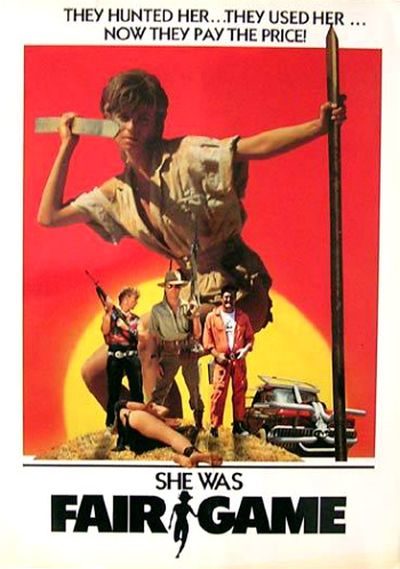 First off, this is not to be confused with the other Australian film of the eighties
First off, this is not to be confused with the other Australian film of the eighties  This feels like a low-budget project in many ways, but manages to punch above its weight, in part due to an impressive supporting cast. While Lou Diamond Phillips, Danny Trejo and Steven Bauer are nowhere near as important as their names on the cover might suggest, their presence provide a solid foundation on which the less well-known members of the cast can build. In particular, Danay García as Loca; having bailed on Fear the Walking Dead after about two episodes, I wasn’t aware of her, but on the basis of this, she’s a name on whom we’ll be keeping an eye.
This feels like a low-budget project in many ways, but manages to punch above its weight, in part due to an impressive supporting cast. While Lou Diamond Phillips, Danny Trejo and Steven Bauer are nowhere near as important as their names on the cover might suggest, their presence provide a solid foundation on which the less well-known members of the cast can build. In particular, Danay García as Loca; having bailed on Fear the Walking Dead after about two episodes, I wasn’t aware of her, but on the basis of this, she’s a name on whom we’ll be keeping an eye. I am a loner. A destroyed woman. A woman destroyed by people… I have a choice – to kill myself or to kill others. I choose TO PAY BACK MY HATERS. It would be too easy to leave this world as an unknown suicide victim. Society is too indifferent, rightly so. My verdict is: I, Olga Hepnarová, the victim of your bestiality, sentence you to death.
I am a loner. A destroyed woman. A woman destroyed by people… I have a choice – to kill myself or to kill others. I choose TO PAY BACK MY HATERS. It would be too easy to leave this world as an unknown suicide victim. Society is too indifferent, rightly so. My verdict is: I, Olga Hepnarová, the victim of your bestiality, sentence you to death.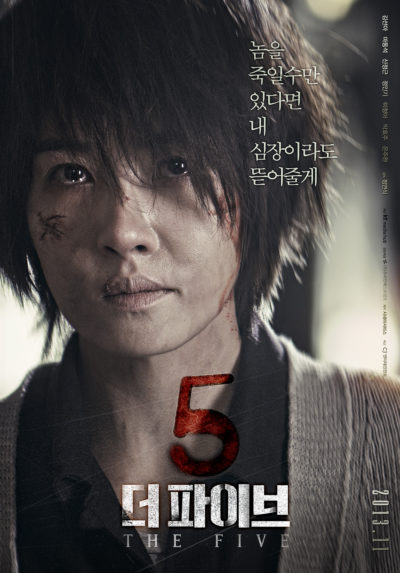 A chance encounter in a convenience store destroys the life of Go Eun-ah (Kim). For her young daughter accidentally sees serial killer Oh Jae-wook (On) abducting his next victim. Realizing he has been spotted, Jae-wook carries out a brutal home invasion, killing both the daughter and Eun-ah’s husband, and leaving her permanently paralyzed. But he has reckoned without Eun-ah’s fortitude. She devotes the rest of her life to tracking down her attacker, and puts together a team of four to help her. All need transplants, for them or their family. So Eun-ah has promised that once Jae-wook has been captured, delivered to her and killed, she will give them her organs. Damn. That’s what I call “fully committed”… But when Jae-Wook realizes he is being hunted, he turns his attentions on the hunters.
A chance encounter in a convenience store destroys the life of Go Eun-ah (Kim). For her young daughter accidentally sees serial killer Oh Jae-wook (On) abducting his next victim. Realizing he has been spotted, Jae-wook carries out a brutal home invasion, killing both the daughter and Eun-ah’s husband, and leaving her permanently paralyzed. But he has reckoned without Eun-ah’s fortitude. She devotes the rest of her life to tracking down her attacker, and puts together a team of four to help her. All need transplants, for them or their family. So Eun-ah has promised that once Jae-wook has been captured, delivered to her and killed, she will give them her organs. Damn. That’s what I call “fully committed”… But when Jae-Wook realizes he is being hunted, he turns his attentions on the hunters.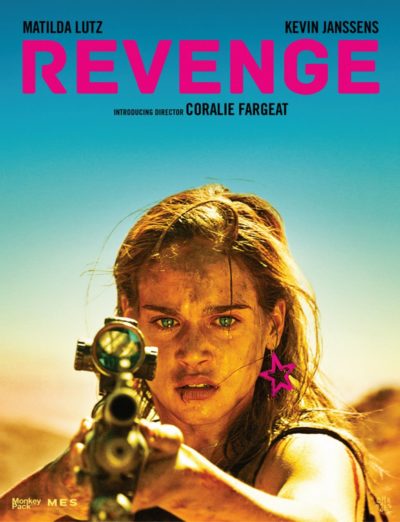
 This French rape-revenge movie is the most blood-drenched GWG film I’ve seen since
This French rape-revenge movie is the most blood-drenched GWG film I’ve seen since  For a film lauded for its supposed up-ending of the male gaze, this feels a bit odd, since it could be read as the sexual assault triggering Jen’s blossoming: rape as psychological therapy. She should thank her attackers! [The image of a rising phoenix branded into her skin, due to her impromptu first-aid, is not exactly subtle in its imagery. Then again, the entire film is not exactly subtle, and proudly defiant as such] If that reading is on shaky ground, it’s also amusing to note Revenge utterly fails the dreaded Bechdel Test, despite being brutally empowering, to a degree rarely seen. More evidence – as if it were really needed – of how shitty the Bechdel Test is at evaluating films.
For a film lauded for its supposed up-ending of the male gaze, this feels a bit odd, since it could be read as the sexual assault triggering Jen’s blossoming: rape as psychological therapy. She should thank her attackers! [The image of a rising phoenix branded into her skin, due to her impromptu first-aid, is not exactly subtle in its imagery. Then again, the entire film is not exactly subtle, and proudly defiant as such] If that reading is on shaky ground, it’s also amusing to note Revenge utterly fails the dreaded Bechdel Test, despite being brutally empowering, to a degree rarely seen. More evidence – as if it were really needed – of how shitty the Bechdel Test is at evaluating films.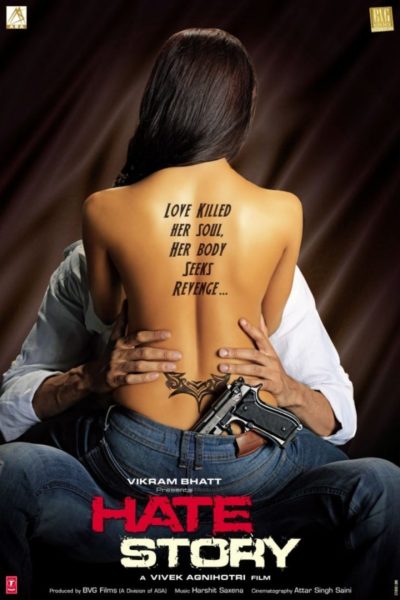 After exposing construction company Cementec as involved in corruption, journalist Kavya Krishna (Dam) is surprised to get a call from Siddharth Dhanrajgir (Devaiya), son of the company’s owner. He ends up offering her a job at far above her previous salary, and the two eventually grow into a relationship. However, it’s all a ruse: Siddharth dumps and firing Kayva, saying, “I fuck those who fuck with me.” When she tries to strike back by telling him she’s pregnant, he has her kidnapped and forced to have an abortion, which leaves Kavya permanently unable to have children. She vows to destroy Siddharth and his company, by any means necessary, using her investigative skills – and no shortage of feminine wiles – to get the information required.
After exposing construction company Cementec as involved in corruption, journalist Kavya Krishna (Dam) is surprised to get a call from Siddharth Dhanrajgir (Devaiya), son of the company’s owner. He ends up offering her a job at far above her previous salary, and the two eventually grow into a relationship. However, it’s all a ruse: Siddharth dumps and firing Kayva, saying, “I fuck those who fuck with me.” When she tries to strike back by telling him she’s pregnant, he has her kidnapped and forced to have an abortion, which leaves Kavya permanently unable to have children. She vows to destroy Siddharth and his company, by any means necessary, using her investigative skills – and no shortage of feminine wiles – to get the information required. Gia Valentina Santella is the daughter of a rich Italian family in California. She doesn’t seem to do much with the bountiful hand fate has dealt her: drinking, casual sex and designer labels appear to be her main interests. But her easy life is rudely disrupted after her parents die in a fire at their estate in Switzerland (!). In the aftermath, she is sent a letter from the man who carried out their autopsies, confessing that he was paid off to conceal the real, much less accidental cause of death. As Gia starts to dig into the past, seeking the truth, it soon becomes apparent that it was a good deal murkier than initially appears. And also, that someone has a strong, vested interest in ensuring it stays covered.
Gia Valentina Santella is the daughter of a rich Italian family in California. She doesn’t seem to do much with the bountiful hand fate has dealt her: drinking, casual sex and designer labels appear to be her main interests. But her easy life is rudely disrupted after her parents die in a fire at their estate in Switzerland (!). In the aftermath, she is sent a letter from the man who carried out their autopsies, confessing that he was paid off to conceal the real, much less accidental cause of death. As Gia starts to dig into the past, seeking the truth, it soon becomes apparent that it was a good deal murkier than initially appears. And also, that someone has a strong, vested interest in ensuring it stays covered.